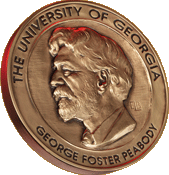THE GEORGE FOSTER PEABODY AWARDS
Entries may be submitted by any person or organization wishing to direct the attention of the Peabody Board to a worthy production, individual or organization. The Board considers recommendations from screening committees comprised of UGA faculty, staff and students but is not necessarily restricted to them. The Board may consider reports of meritorious service developed from other sources or act on its own initiative. The competition is open to entries produced for alternative distribution, including corporate, educational, home-video release, CD-ROM and World Wide Web. In general, such non-broadcast or non-cable entries should be publicly available. Programs produced and intended for wide release theatrical motion picture exhibition are not eligible. history
In 1938, the National Association of Broadcasters formed a committee to establish a prestigious award for radio. One member, Lambdin Kay, manager of WSB Radio in Atlanta, made it his special project.
Using the Pulitzer Prize program as a guideline, Kay approached John E. Drewry, dean of the Grady School, about sponsoring the awards. By 1940, the plan had been endorsed by the NAB and the Board of Regents of the University of Georgia. The awards program was named for George Foster Peabody, a native Georgian, industrialist, financier and major benefactor of the university. His daughter, Marjorie Peabody Waite, served on the first Advisory Board and commissioned the design of the famous bronze medallion.
The first awards, for radio programs broadcast in 1940, were presented at a banquet at the Commodore Hotel in New York on March 29, 1941. The ceremony was broadcast live nationwide on CBS and included addresses by CBS founder and board chairman William S. Paley.
Television programs first received awards in 1948. Early television winners include Howdy Doody, The Ed Sullivan Show and Edward R. Murrow's See It Now series. Recent winners include The Wire, The Daily Show with Jon Stewart, Dora the Explorer, Save Our History: Voices of Civil Rights, Scrubs and the website four docs (channel4.com/fourdocs). Cable television was first recognized in 1981 when Home Box Office and Ms. magazine won for She's Nobody's Baby: A History of American Women in the 20th Century.
Personal Peabody Award winners over the years have included Rod Serling, Walter Cronkite, Oprah Winfrey, Bill Moyers, Christiane Amanpour, and Live Aid-organizer Bob Geldof. Today the George Foster Peabody Awards are often cited as the most selective and prestigious in electronic media. Each year, from more than one thousand entries, the Peabody Board selects the most outstanding works by unanimous vote. Though there is no set number of awards, no more than 36 have ever been presented in a single year. |

 First presented in 1941, the George Foster Peabody Awards recognize distinguished achievement and meritorious service by broadcasters, cable and Webcasters, producing organizations, and individuals. The awards program is administered by the Grady College of Journalism and Mass Communication at the University of Georgia. Selection is made each spring by the Peabody Board, a 16-member panel of distinguished academics, television critics, industry practitioners and experts in culture and the arts.
First presented in 1941, the George Foster Peabody Awards recognize distinguished achievement and meritorious service by broadcasters, cable and Webcasters, producing organizations, and individuals. The awards program is administered by the Grady College of Journalism and Mass Communication at the University of Georgia. Selection is made each spring by the Peabody Board, a 16-member panel of distinguished academics, television critics, industry practitioners and experts in culture and the arts.



